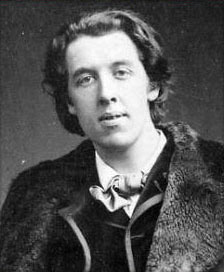Lord Illingworth. So you really refuse to marry me?
Mrs. Arbuthnot. Yes.
Lord Illingworth. Because you hate me?
Mrs. Arbuthnot. Yes.
Lord Illingworth. And does my son hate me as you do?
Mrs. Arbuthnot. No.
Lord Illingworth. I am glad of that, Rachel.
Mrs. Arbuthnot. He merely despises you.
Lord Illingworth. What a pity! What a pity for him, I mean.
Mrs. Arbuthnot. Don’t be deceived, George. Children begin by loving their parents. After a time they judge them. Rarely if ever do they forgive them.
Lord Illingworth. [Reads letter over again, very slowly.] May I ask by what arguments you made the boy who wrote this letter, this beautiful, passionate letter, believe that you should not marry his father, the father of your own child?
Mrs. Arbuthnot. It was not I who made him see it. It was another.
Lord Illingworth. What fin-de-siècle person?
Mrs. Arbuthnot. The Puritan, Lord Illingworth. [A pause.]
Lord Illingworth. [Winces, then rises slowly and goes over to table where his hat and gloves are. Mrs. Arbuthnot is standing close to the table. He picks up one of the gloves, and begins pulling it on.] There is not much then for me to do here, Rachel?
Mrs. Arbuthnot. Nothing.
Lord Illingworth. It is good-bye, is it?
Mrs. Arbuthnot. For ever, I hope, this time, Lord Illingworth.
Lord Illingworth. How curious! At this moment you look exactly as you looked the night you left me twenty years ago. You have just the same expression in your mouth. Upon my word, Rachel, no woman ever loved me as you did. Why, you gave yourself to me like a flower, to do anything I liked with. You were the prettiest of playthings, the most fascinating of small romances . . . [Pulls out watch.] Quarter to two! Must be strolling back to Hunstanton. Don’t suppose I shall see you there again. I’m sorry, I am, really. It’s been an amusing experience to have met amongst people of one’s own rank, and treated quite seriously too, one’s mistress, and one’s—
[Mrs. Arbuthnot snatches up glove and strikes Lord Illingworth across the face with it. Lord Illingworth starts. He is dazed by the insult of his punishment. Then he controls himself, and goes to window and looks out at his son. Sighs and leaves the room.]
Mrs. Arbuthnot. [Falls sobbing on the sofa.] He would have said it. He would have said it.
[Enter Gerald and Hester from the garden.]
Gerald. Well, dear mother. You never came out after all. So we have come in to fetch you. Mother, you have not been crying? [Kneels down beside her.]
Mrs. Arbuthnot. My boy! My boy! My boy! [Running her fingers through his hair.]
Hester. [Coming over.] But you have two children now. You’ll let me be your daughter?
Mrs. Arbuthnot. [Looking up.] Would you choose me for a mother?
Hester. You of all women I have ever known.
[They move towards the door leading into garden with their arms round each other’s waists. Gerald goes to table L.C. for his hat. On turning round he sees Lord Illingworth’s glove lying on the floor, and picks it up.]
Gerald. Hallo, mother, whose glove is this? You have had a visitor. Who was it?
Mrs. Arbuthnot. [Turning round.] Oh! no one. No one in particular. A man of no importance.
Curtain
